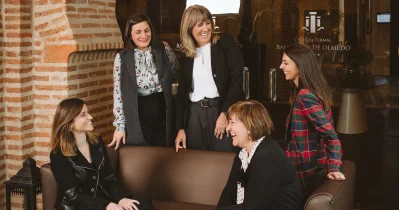8 March: seven questions for six directors of Castilla Termal

Make your booking
Checkin - Checkout
8 March: seven questions for six directors of Castilla Termal
They are professionals with a long career, they hold management positions and lead teams at Castilla Termal Hoteles. They are six women who, on the occasion of this 8th March, offer us their impressions on how we have evolved towards equality, what steps we still have to take and how companies are moving towards effective equality.
With 60% of their management positions occupied by women, they all agree that Castilla Termal "has equality in its DNA" and that the right steps are being taken. "At Castilla Termal we are concerned about being proactive, we work for equal employment opportunities, whether you are a man or a woman," says Mª Carmen Arranz, financial director and deputy director of the company. She believes that in the company "the value and potential of people have always prevailed", but this is not the same everywhere: "I know managers in companies who, after becoming mothers, have conditioned their reduction in working hours to not having the possibility of continuing to climb the career ladder".
In fact, most of them believe that motherhood is the biggest difficulty. "Reconciling work and personal life is complicated when children are young and companies do not make it easy for you. Castilla Termal does it very well, it makes it possible to reconcile work and personal life, even though we are a very complicated sector, due to working hours", says Ana Chamizo, Director of the Spa Area.
The Director of Management and Development, Ángela Sinovas, explains, however, that after having worked in different countries, companies and sectors, "the fact of being a woman and a mother has never conditioned me when it comes to doing my job well or for companies to stop trusting in my career and my growth".
Education and information
Progress is being made, but the road is long and there are still steps to take. Thus, asked when "the first woman to achieve..." will cease to be news, they agree that the key is education.
Maite Sanz, director of Castilla Termal Burgo de Osma, is clear that we must "start from childhood to educate in the value of equality, a challenge that seems a utopia, difficult to achieve, but not for that reason we must not abandon it".
Ana Chamizo reminds us that "we ourselves forget that our partners can and should also reconcile work and family life. It is educational, customary; we must work on it from the time our children are young and educate them in equality and respect. Fatherhood should be as important as motherhood".
For Ángela Sinovas, "progressive education and the elimination of stereotypes" are also essential, but she also believes that "advances in equality should continue to focus on the differences in maternity and paternity leave and work-life balance".
The commercial director, Lucía Pumares, highlights, for her part, that "more and more women are reaching more and more important challenges in the business world and this generates less surprise. But I believe that we must make women's achievements more visible because, in general, they are much less talked about. If we don't talk about them, we perpetuate the feeling that our achievements don't exist.
They also speak out about the gender gap that still exists today: the difference between unemployed women and men in Spain is 3.25%. Why? Rocío García Serrano, Director of Quality and Sustainability, is clear: "In my opinion, it is the consequence of a social structure in which, even today, the roles of men and women in the workplace are treated differently: men as producers and women as mothers and carers".
Lucía Pumares also sees it in a similar way and stresses that "we must improve these figures with the support of laws that promote real equality, with measures such as the obligation to have equality plans or more structures for childcare during non-teaching hours. Spain lags far behind other countries in this area. And she hopes that "hopefully very soon the situation that we women live in Castilla Termal will not be seen as privileged or as a reason for example or pride, but will be taken for granted in many other companies".
Equality plans
In order to evolve in this sense, as of 8 March, it is compulsory for companies with more than 50 workers to have an equality plan. This is something that Maite Sanz considers absolutely necessary as "a great leap forward is needed to put an end to discrimination in terms of the role of women in the workplace, which could materialise when the public authorities legislate in this sense".
For Rocío García Serrano, "it means that companies must commit themselves to analyse and review the relationship with their workers and implement equal treatment and equal opportunities policies".
"The measure is positive and adds value to what was already being done in companies such as Castilla Termal, where equality when it comes to hiring, remuneration and the rights of our workers has been a reality for some time", concludes Mª Carmen Arranz.